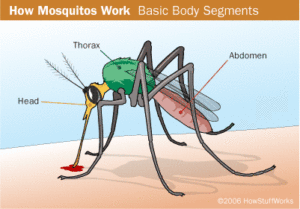Health Message for U.S. Citizens
April 16, 2014
Chikungunya Fever Health Alert
The U.S. Embassy has received reports that chikungunya fever has been detected in the Dominican Republic; spread to Haiti is considered likely. We are issuing this message to inform Americans about the disease and to provide tips on how to prevent it.
Disease: Chikungunya fever is a mosquito-transmitted viral disease transmitted by the Aedes mosquito, the same type that causes dengue fever and which bites mostly during the daytime. Local transmission of Chikungunya was identified in the Caribbean in late 2013; confirmed cases were recently identified in the Dominican Republic.
Symptoms: Symptoms usually begin 3-7 days after being bitten by an infected mosquito. They typically include fever and severe joint pain in the hands and feet. Other symptoms may include fever, headache, muscle pain, joint swelling, and rash.
Treatment: There is no specific antiviral treatment for chikungunya virus, but medicines are available to help reduce fever and pain. See your doctor if you think you or a family member might have chikungunya.
Illness: Most patients feel better within a week, although some people may develop longer-term joint pain. People at increased risk for severe disease include pregnant women and their unborn babies in the third trimester, newborns, adults over 65, and those with chronic health conditions, such as high blood pressure, diabetes, or heart disease. Deaths are rare.
Prevention: At this time there is no vaccine or medication to prevent the chikungunya infection. Prevention measures focus on reducing mosquito exposure (especially by pregnant women) by use of mosquito repellents, long-sleeved shirts and long pants, air conditioning, door and window screens, permethrin-treated clothing, elimination of standing water where mosquitos breed, and local mosquito control measures.
Recommendations: Pregnant women should take extra precautions to avoid mosquito bites. People at increased risk for severe disease should not travel to areas with on-going chikungunya outbreaks. If you are sick with chikungunya, avoid additional mosquito bites to prevent further spread of the virus.
The Centers for Disease Control and Prevention additional information on the chikungunya virus on the CDS Website.
We strongly recommend that U.S. citizens traveling to or residing in Haiti enroll in the Department of State’s Smart Traveler Enrollment Program (STEP). STEP enrollment provides the latest security updates and makes it easier for the U.S. Embassy or nearest U.S. Consulate to contact you in an emergency.
Travelers are advised to regularly monitor the travel information page of the State Department’s website, where you can find current Travel Warnings for Haiti, Travel Alerts, and the Worldwide Caution. Read the Country Specific Information for Haiti. For additional information, refer to “A Safe Trip Abroad” on the State Department’s website.
Contact the U.S. Embassy for up-to-date information on travel restrictions. You can also call 1-888-407-4747 toll-free from within the United States and Canada, or 1-202-501-4444 from other countries. These numbers are available from 8:00 a.m. to 8:00 p.m. Eastern Time, Monday through Friday (except U.S. federal holidays). Follow the Bureau of Consular Affairs on Twitter and Facebook and download our free Smart Traveler iPhone App to have travel information at your fingertips.
For any emergencies involving U.S. citizens, please contact the U.S. Citizens Services Unit of the U.S. Embassy’s Consular Section, located at Tabarre 41, Boulevard du 15 Octobre, Tabarre, Haiti; telephone 509-2229-8000; after hours emergency telephone 509-3464-3998; ACS unit fax 509-2229-8027; e-mail; website.
American Citizen Services
Consular Section | U.S. Embassy Port-au-Prince | Boulevard 15 Octobre, Tabarre 41| Tabarre, Haiti,
Tel: (+509) 2229-8000 | Fax: (+509) 2229-8028 | E-mail: acspap@state.gov
Embassy homepage: (haiti.usembassy.gov)| State Department Homepage: (travel.state.gov)
Haiti travel tips:
– You may visit Haiti without a visa for a total of ninety days within a six-month period.
– Register your presence abroad by enrolling in STEP (Smart Traveler Enrollment Program) online at (step.state.gov/step/)
– Additional information for US citizens travelling in Haiti is available in the Country Specific Information on Haiti at (travel.state.gov/travel/cis_pa_tw/cis/cis_1134.html)
